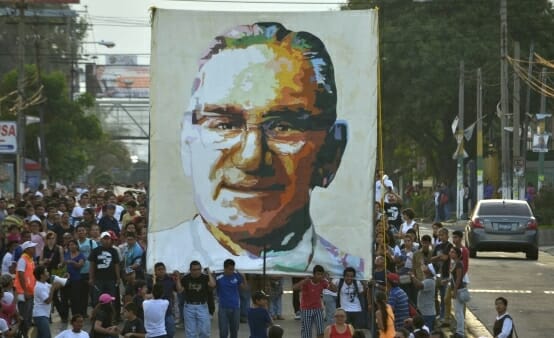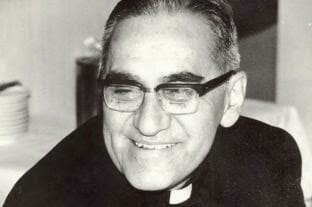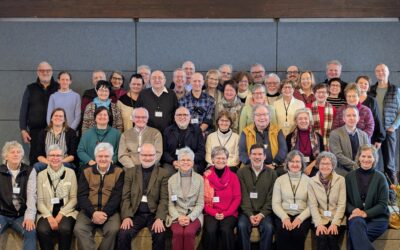“A preaching that does not denounce sin is not Gospel preaching,” Bishop Romero stated in one of his talks. His martyrdom, which took place on March 24, 1980 as he celebrated the Eucharist in the chapel of the hospital for terminally ill patients, where he also resided, gave strength to many Salvadoran families who had lost relatives and friends during the civil war which turned ruthless after his death. Still today his witness remains a powerful call to peace, brotherhood and reconciliation.
“The news that Pope Francis had signed the decree recognising the martyrdom in odium fidei (in hatred of the faith) of Bishop Oscar Arnulfo Romero caused much rejoicing among the people. Bishops had the bells rung in all the churches of El Salvador in expression of the great jubilation,” Father Filippo Casabianca writes from the Focolare’s Central American centre. “From when Bergoglio became pope everyone began to hope that, knowing the urgent needs of the poor and the shady schemes of some Latin American dictatorial regimes, the progress of the Cause would be unblocked. Soon there will be the Solemn Opening of the Cause of Beatification, in El Salvador.
What is the backstory of that block? “The missionary work of the Church during that period was traversed by tensions that undulated between genuine faithfulness to the Second Vatican Council’s teaching about a preferential option for the poor and being near to the least, to the temptation of some who felt that it was possible to be associated with movements that had a Marxist imprint. This is what they wanted to accuse Romero of, to the point of silencing his voice.” But, in El Salvador, the Focolare spirituality also has its roots planted in the soil of war horrors. The first focolarinos visited this land in the late 1970s. They came from Colombia until the first Mariapolises of 1982, which were held in Santiago de Maria.
 “The connecting roads were alternately patrolled by guerrillas and military” continues Filippo, “so you had to find makeshift ways to get around or you would be placed under interrogation that could lead to forced recruitment. “The war had followed the death of Romero and his message was quite alive in everyone.” “The words, the teaching and witness of Bishop Romero,” says Reynaldo, one of the first young people of the Movement in El Salvador, “powerfully resounded in those who had the fortune of discovering the Ideal of unity, particularly that call to opting for the poor. It was a strong call to Christian integrity, causing perplexity in some, embraced by many, at times manipulated. “Bishop Romero’s witness joined to the encounter with the experience of Chiara Lubich and her companions during the Second World War in Trent, made us embrace the charism of unity in a purer manner, and it helped us go against the tide.”
“The connecting roads were alternately patrolled by guerrillas and military” continues Filippo, “so you had to find makeshift ways to get around or you would be placed under interrogation that could lead to forced recruitment. “The war had followed the death of Romero and his message was quite alive in everyone.” “The words, the teaching and witness of Bishop Romero,” says Reynaldo, one of the first young people of the Movement in El Salvador, “powerfully resounded in those who had the fortune of discovering the Ideal of unity, particularly that call to opting for the poor. It was a strong call to Christian integrity, causing perplexity in some, embraced by many, at times manipulated. “Bishop Romero’s witness joined to the encounter with the experience of Chiara Lubich and her companions during the Second World War in Trent, made us embrace the charism of unity in a purer manner, and it helped us go against the tide.”
Going against the tide is still a feature of the Focolare Movement in El Salvador because of its social involvement. The rehabilitation of prisoners, for example, within the framework of the local Church’s prison ministry, involves Focolare teams. They visit the infamous Mariona Prison which houses the most dangerous criminal and drug-traffick bosses. They are currently in regular contact with some 180 people serving different sentences, who attend Word of Life meetings in groups of 18 people. In the most recent meeting someone remarked: “I ask forgiveness from my jail mates, because I treated them with violence, but I want to change.”
Other activities focus on social inclusion in a village at risk. The situation turned dangerous and the parish priest advised the Movement’s members to be careful. In another two cities, the Focolare runs kindergartens and after-school programmes oriented towards curbing the school dropout rate, which encourages criminal recruitment.
Following the example of Romero in El Salvador and beyond, there is a desire to be faithful to the Gospel by living for all, especially the small, the poor and the least.





0 Comments